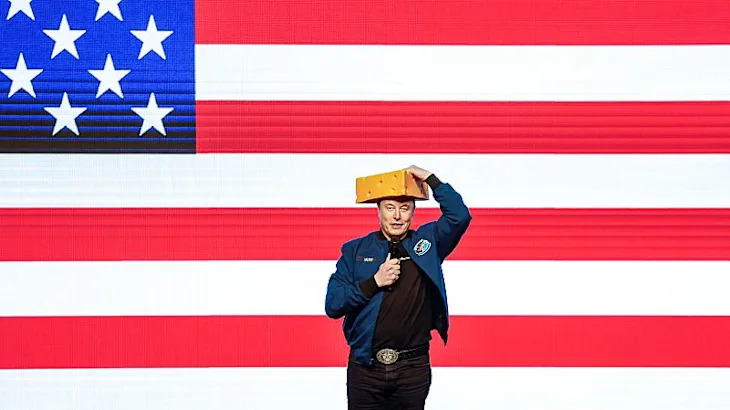Tesla’s share price fell nearly 6% at the US open on Wednesday afternoon after the company’s latest first-quarter sales figures failed to cheer investors with deliveries down 13%.
It comes as the group’s CEO, Elon Musk, is discovering the hard way - that everyday consumers and investors aren't afraid to vote with their wallets.
Related
On Sunday, Musk took part in a rally in Wisconsin to back Brad Schimel, a right-wing candidate running in the Wisconsin Supreme Court election against liberal candidate Susan Crawford.
Musk’s backing included over $21 million (roughly €19,39m) in support, making the race the most expensive single judicial election in US history, sparking debate about the influence of wealthy individuals in judicial races and politics.
At the rally, Musk admitted that his “Tesla stock and the stock of everyone who holds Tesla has gone, went roughly in half,” and said his current role as the head of the Department of Government Efficiency, or DOGE, “is a very expensive job”.
While Musk does not receive a salary for his role at DOGE, the implicit understanding was that by being close to the centres of power, he would either have insights that would help shape his business decisions, or that his position in an exceedingly influential government position would inspire investor confidence.
Related
In December, before Trump’s inauguration but after Musk had become widely associated with the incoming president – especially as his top campaign contributor – Musk’s net worth peaked at approximately $400 billion (€369.6bn). With regards to Tesla, the stock reached an all-time high on 17 December with a closing price of $479.86 (€442.47).
However, Trump's rhetoric – and Musk’s accompanying support of it, along with his own continuous commentary on US and global political affairs, and especially European issues – drove the value of the stock down to a low of about $220 (€203.28) in early March.
Musk’s wealth is estimated to have declined by $120bn (€110.88bn), bringing it down to $280bn (€259.72bn).
Putting their money where their politics are
Musk may have underestimated how much his divisive comments and involvement with the Trump administration could impact the profitability of his companies.
However, Tesla only encompasses about 27% of his personal wealth. His biggest financial asset and largest chunk of his wealth, at 40%, is tied to SpaceX. Tesla is the company that is the most tied to direct consumer demand or vehicle sales.
Average consumers have less of a sway on the profitability of SpaceX, Neuralink, xAI and others that are financed through government contracts, tech investors, venture capital or cross-funded from his other companies. Therefore, his move to side with Trump is arguably proving more profitable on this side, negating his losses via Tesla.
In Europe, China’s BYD (Build Your Dreams) electric vehicles are making strong inroads in a market that - while also sceptical of Chinese products - is more price-sensitive.
BYD has become Tesla’s leading global competitor, managing an impressive 60% increase in unit sales in Q1 compared to the same period last year. The cheapest model available in Europe is priced at around €20,000 – and this accounts for tariffs and environmental standards that drive up the price, since the cheapest BYD available on the Chinese market, the Seagull, is approximately $9,700 (€8,976.80).
As European as the Eiffel Tower
Tesla cars are considered to operate within the mid-range to luxury market, with the cheapest model currently being the Model 3 Sedan at €46,000.
Compare that to the prices offered by European carmaking giants – the Peugeot e-208 is currently priced at €32,500, and both Volkswagen’s ID.3 and Renault’s Zoe start at €36,000.
Even the most expensive of the newer offerings from Germany’s legacy automaker, otherwise known for its premium gas-guzzling cars, BMW’s i4 (€58,000) is performing better in European markets, marking a 36% increase in January alone. The i4 is also edging out its direct Tesla competitor, the Model 3, in the US and marked a 57% increase in sales compared to the same period last year.
For a legacy European brand like BMW to outpace Tesla — not just in Europe but even in the US — despite commanding a higher price point, underscores a growing truth: The EV market is just as sensitive to political symbolism as any other part of public life.


